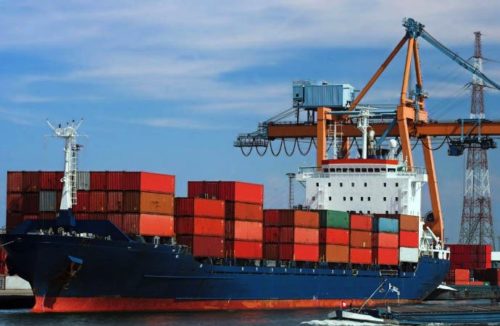
The United States Coast Guard (USCG) has imposed conditions of entry on ships that have visited some port terminals in Nigeria in their last five port calls over lapses in the implementation of the International Ship and Port Facility Security Code (ISPS Code), SHIPS & PORTS authoritatively reports.
Other countries sanctioned by the USCG over infractions in the ISPS Code implementation include Côte d’Ivoire, Equatorial Guinea, The Gambia, Guinea-Bissau, Iran, Iraq, Liberia, Libya, Madagascar, Micronesia, Nauru, Sao Tome and Principe, Seychelles, Syria, Timor-Leste, Venezuela, and Yemen.
On May 8, 2018, SHIPS & PORTS had reported exclusively that no fewer than nine ships were robbed at berths in various port terminals across the country between March and April 2018, even as stakeholders accused the Nigerian Ports Authority (NPA) and the Nigerian Maritime Administration and Safety Agency (NIMASA), which is the Designated Authority (DA) for implementation of the ISPS Code in Nigeria, of taking little or no action to curtail the attacks.

Rotimi Amaechi. The Federal Ministry of Transportation oversees the affairs of Nigerian Ports Authority (NPA) and the Nigerian Maritime Administration and Safety Agency (NIMASA).
The ISPS Code is an amendment to the Safety of Life at Sea (SOLAS) Convention (1974/1988) on minimum security arrangements for ships, ports and government agencies. It came into force in 2004, and prescribes responsibilities to governments, shipping companies, shipboard personnel, and port/facility personnel to detect security threats and take preventative measures against security incidents affecting ships or port facilities used in international trade.
In an official statement it issued yesterday and which was exclusively obtained by SHIPS & PORTS, the U.S. Coast Guard said the conditions of entry, which will come into effect on April 12, 2019, are intended to protect the United States from vessels arriving from countries that have been found to have deficient anti-terrorism port measures in place.
According to the Coast Guard, “The Maritime Transportation Security Act of 2002 (MTSA) has mandated that the United States Coast Guard evaluate the effectiveness of anti-terrorism measures in foreign ports and provides for the imposition of conditions of entry on vessels arriving to the United States from countries that do not maintain effective anti-terrorism measures.”
Specifically on the ports in Seychelles, it said, “The Coast Guard has determined that Seychelles is not maintaining effective anti-terrorism measures in all of its ports. Actions required as listed in paragraphs C and D of this Port Security Advisory take effect for vessels that arrive in the United States upon or after April 12, 2019, after visiting ports in the Seychelles as one of their last five ports of call.”
The Coast Guard’s sanctions on Nigerian ports, however, exempts 20 terminals, which are fully compliant with the provisions of the ISPS Code. They are Apapa Bulk Terminals, APM Terminals Apapa, Bert Operation Platform (BOP Jetty), Bonny River Terminal, ENL Consortium Terminals, Escravos BOP, Federal Lighter Terminal Onne, Federal Ocean Terminal Onne, Five Star Logistics, FSO Yoho, Greenview Terminal and Intels Nigeria Limited Terminal.

Other compliant terminals include LPG FSO, MRS Oil Gas Jetty, Nigerdock Jetty, Port & Cargo, PTML Terminal, Shell Bonny Oil & Gas Terminal, Shell Export Terminal Forcadoes, Shoreline Logistics Jetty and the Tincan Island Container Terminal.
The Coast Guard stated that all vessels arriving to the United States that visited the listed countries during their last five port calls must take certain actions while in the countries as a condition of entry into U.S. ports.
Affected vessels, according to the Coast Guard, “Must implement measures per the ship’s security plan equivalent to Security Level 2; ensure that each access point to the ship is guarded and that the guards have total visibility of the exterior (both landside and waterside) of the vessel.”
“Guards may be provided by the ship’s crew, however, additional crewmembers should be placed on the ship if necessary to ensure that limits on maximum hours of work are not exceeded and/or minimum hours of rest are met, or provided by outside security forces approved by the ship’s master and Company Security Officer,” it further stated.
It also said that the ships must attempt to execute a Declaration of Security; log all security actions in the ship’s security records; and report actions taken to the cognizant U.S. Coast Guard Captain of the Port prior to arrival in the U.S.

“Vessels that visited the countries listed in paragraph B (with exceptions noted) on or after the effective date in paragraph A, during their last five port calls will be boarded or examined by the Coast Guard to ensure the vessel took the required actions.
“Failure to properly implement the actions listed in paragraph C.1 through C.5 may result in delay or denial of entry into the United States,” it stated.
It also said that vessels that visit the 18 sanctioned countries must take certain actions while in U.S. ports.
“Based on the findings of the Coast Guard boarding or examination, the vessels that visited the countries listed in paragraph B (with exceptions noted) on or after the effective date in paragraph A may be required to ensure that each access point to the ship is guarded by armed security guards and that they have total visibility of the exterior (both landside and waterside) of the vessel while in U.S. ports.
“The number and location of the guards must be acceptable to the cognizant U.S. Coast Guard Captain of the Port. For those vessels that have demonstrated good security compliance and can document that they took the measures called for in C.1. through C.4. above, the armed security guard requirement will normally be waived,” the Coast Guard added.
Copyright 2018 Ships & Ports Ltd. Permission to use quotations from this article is granted subject to appropriate credit given to www.shipsandports.com.ng as the source.